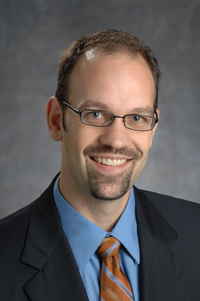Benjamin Williams '96 Wins U.S. Government's Highest Honor For Young Researchers

Details
The UCLA associate professor of electrical engineering is one of only 105 people this year selected for a Presidential Early Career Award for Scientists and Engineers.
The White House announced last week that Benjamin Williams '96 is among 105 young researchers from across the country who will receive the Presidential Early Career Awards for Scientists and Engineers (PECASE). This award is the U.S. government's highest honor bestowed on scientists and engineering researchers in the early stages of their careers. Williams, a professor of engineering at UCLA since 2007, will receive his award at a ceremony in Washington, D.C., this spring.
“These early-career scientists are leading the way in our efforts to confront and understand challenges from climate change to our health and wellness,” President Obama said. “We congratulate these accomplished individuals and encourage them to continue to serve as an example of the incredible promise and ingenuity of the American people.”
Williams’ Terahertz Devices and Intersubband Nanostructures lab is focused on the development of lasers and other devices that manipulate light in the terahertz range of frequencies. The terahertz range represents one of the last “frontiers” of the electromagnetic spectrum; it occupies the space between microwave and infrared wavelengths. Terahertz waves can be used to analyze plastics, clothing, semiconductors, and works of art without damaging the materials being examined; for chemical sensing and identification; and to investigate the formation of stars and composition of planetary atmospheres.
"It's nice to have recognition for the work that we are doing in my lab to develop new kinds of lasers," says Williams of his PECASE honor. "Since the work is mostly done by graduate students and a few undergrads, hopefully this [award] will help to give their work a little more visibility, and help to attract the next batch of students for my lab."
Williams is the area director for Physical and Wave Electronics at the UCLA Electrical Engineering Department, and is also a member of the California NanoSystems Institute. He majored in physics at Haverford and went to earn a Ph.D. from the Massachusetts Institute of Technology, where he was also a postdoctoral scholar.
"I think the liberal arts breadth of Haverford gave me a different background than most of my engineering colleagues in grad school—all of the writing in the humanities classes really paid off," he says. "More specifically, Haverford Physics had great professors and great fellow students. I got a really fundamental education in physics and got a chance to do research. I draw on many of the things I learned in my Haverford classes even now whenever I teach."
PECASE was established in 1996 by President Bill Clinton. Awardees, who are nominated by a variety of federal departments and agencies that fund research, are selected for their pursuit of innovative research at the frontiers of science and technology and their commitment to community service as demonstrated through scientific leadership, public education, or community outreach.



